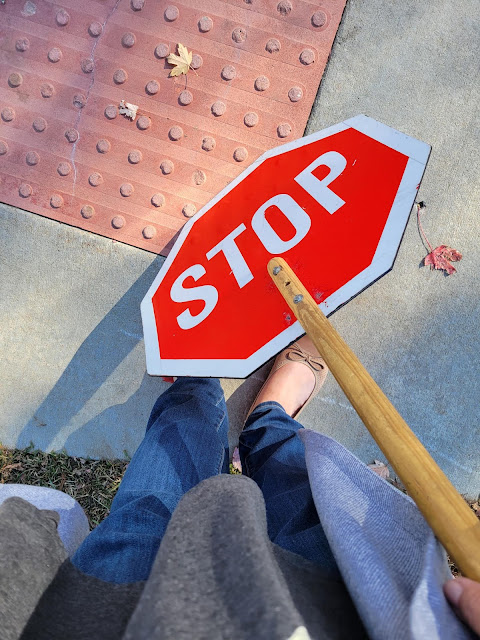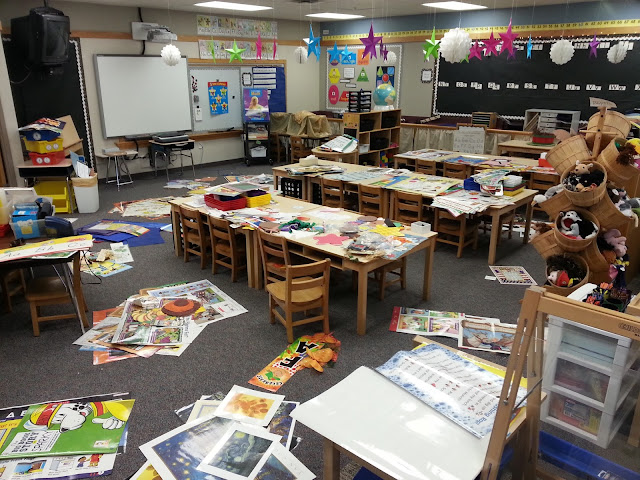We're At a Negative Seventy-Eight Right Now: Please Stop
I'm a feeler, an empath, which ironically is probably why many consider me unapproachable, and the few who do casually engage with me find me guarded or describe me as "private." I have no way of keeping your emotions from affecting my blood pressure and mood, truly. As a kindergarten teacher, it has been easier for me to discriminate between the emotions and behaviors of young children and my own. I've been leaning heavily upon that skill this week because this was a week in our library.
A week where the typically isolated and individualized social-emotional needs of students and staff combined to create an absolutely thunderous avalanche of outbursts set off by straws that broke every camels' back every single day, in every single class. It wasn't the hint of an uneasy undercurrent that we usually experience near full moons wafting through the hallways. It was a fully formed, deeply saturated, dense mood.
This is my first year as a librarian, though my twenty-sixth in teaching. Aside from raising my own children, having monthly buddy lessons with fifth or sixth-graders and hosting occasional multi-age activities with a limited number of students have been the only professional experiences I've had with a wide range of students. Since the start of the school year, I've regularly reminded myself that I don't have to recreate the wheel when it comes to relationship building with children, no matter their age. Communicate honestly. Model the one expectation I have: that we will be safe, kind, and helpful (even when we don't feel inclined to be). Be consistent. Intentionally remind students that they are already whole, expert learners, because so many in this era of data-fueled-mass-interventions believe themselves to be broken and flawed.
I suspect (partly) because of these pedagogical decisions, I witnessed all that I did this week, during the short but intense visits from twenty-two classrooms. Students under constant rein, continually reminded of consequences when they were elsewhere in the building, entered the library, and within minutes, were lashing out, self-soothing (several in some furniture-damaging ways), crying, or trying to find some way to wall themselves off from members of their cohorts.
Not because they were rebelling.
Not because good classroom management is lacking.
Not because of an ineffective educator who has "only" taught kindergarten.
Not because I'm too old.
Not because I'm a library greenhorn.
Because they couldn't stop the avalanche. And because they were in a safe space, with a safe person.
So they did what children do. And it was a lot.
*****
In all of my years as an educator, including last year when I was teaching kindergarten students via Zoom on iPad screens, my go-to for helping students has included all of the interventions, resource-gathering, team-building, and procedure-following systems that are in place to support learners. I've taught structured social-emotional lessons and guided students in their day-to-day interactions and problem-solving experiences. I've collaborated with school counselors, social workers, nurses and families. I've tracked behaviors, identified antecedents, created individualized behavior plans, modeled expectations and offered authentic encouragement. I have n-e-v-e-r requested that a student be removed from my classroom and given to another teacher. I have had the autonomy to determine on my own if and when to ask for an administrator's help, and it has been rare for me to request it.
This year's uptick in student behaviors doesn't feel the same to me because IT ISN'T THE SAME. While I appreciate knowing that the systems listed above are still in place, my gut tells me that using them in the same old way will be as effective as trying to reapply a bandaid once it's already been stuck and peeled off repeatedly. So this week, I kept weaving more patience rope every time I came to the end of mine. My fingers blistered and I hope they callous over. I kept my tone low, and because we're masked, my eyes kind. Shrill and fierce would have been interpreted as bluster, not authority. I even changed a planned activity in favor of fifteen minutes of yoga for a kindergarten class because their executive function needs weren't going to allow adherence to the state's library, media, and technology standards.
By the end of every class, every class, students were calmer. Their shoulders were relaxed. Apologies to others and even to me had been sincerely given. I was thanked by students, not from the repeated practice of manners, but from their sense of relief. Fist bumps, high fives, nods with eye contact from the big boys, and hugs from the youngers. A whispered, "I love you, Mrs. Sommerville," from a middle grader.
I was a wreck this week because this cycle repeated itself every fifty minutes when I had back-to-back classes, and as I witnessed similar scenes with very different outcomes elsewhere in the building while performing academic interventions. And I knew I'd be twelve hours short on time needed to maintain the library. And I was trying to not think about how next week's PD includes performative "self-care" where I'm expected to participate in ga-ga ball, pickleball, yoga, or meditation when what would REALLY help lower and reduce my stress level for the short and long-term would simply be to have the time necessary to do my actual job well. This empath and I suspect other educators including those with social anxiety, are having an incredibly difficult time digging ourselves out from the avalanche using offered spoons as we're denied shovels. And we ARE digging.
You know the "it takes seven positives to undo one negative" tip all educators have been told in regard to student performance, and administrators have been told when considering staff motivation?
I'm pretty sure we're all at a negative seventy-eight right now.



Comments
Post a Comment